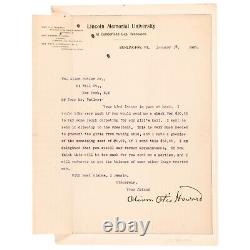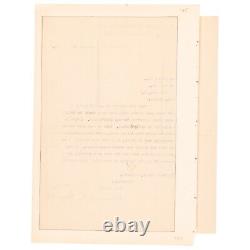
- Index
- Framing
- Material
- Photographer
- Subject
- Americana (17)
- Andrew Jackson (4)
- Civil War (40)
- Collectible (10)
- Figures & Portraits (8)
- Historic & Vintage (3)
- History (59)
- Law & Government (3)
- Literature & Fiction (7)
- Men (7)
- Men, Civil War (21)
- Men, Military (16)
- Military (34)
- Military & Political (72)
- Military & War (171)
- Military, Political (3)
- Portrait (5)
- Presidents (3)
- Tree (2)
- United States (2)
- ... (2434)
- Type
- Action Figure (26)
- Artillery (2)
- Biography (3)
- Bust (2)
- Cavalry (3)
- Civil War Book (2)
- Civil War Map (3)
- Code Key (4)
- Hardcover (2)
- History (2)
- Locomotive (2)
- Negative Film Photo (9)
- Painting (4)
- Photograph (193)
- Print (11)
- Santa (6)
- Sculpture (24)
- Soldier (2)
- Sports Trading Card (2)
- Steam Locomotive (6)
- ... (2613)
- Unit Of Sale
1905 Civil War General OLIVER OTIS HOWARD Typed Letter Fully Signed





1905 CIVIL WAR GENERAL OLIVER OTIS HOWARD TYPED LETTER FULLY SIGNED. 1905 General OLIVER OTIS HOWARD Typed Letter Singed as President of the Lincoln Memorial University. Civil War Union Army Major General and Medal of Honor Winner, who led his division at the Battles of Chancellorsville, Fredericksburg, and was Senior Commander at Gettysburg; given charge of the Freedmen's Bureau in mid-1865 missioned to Integrate the former Slaves into Southern society.
January 18, 1905-Dated, Typed Letter Fully Singed, "Oliver Otis Howard" on his personal Letterhead as President of the "Lincoln Memorial University, " 1 page, measuring 8.5" x 10.5", 4to. At Burlington, Vermont, Very Fine. There are several trivial ink drops at the top left from when signing, overall even in tone on wove period paper.
Typed in purple, it is boldly Signed, "Oliver Otis Howard" using his full name, written in vivid deep ink measuring a huge 3.5 long at the conclusion. Letter is inlaid, tipped into larger sheet of heavier paper stock, likely when part of a collection. As the legend goes, in 1863 President Abraham Lincoln commented to General O. Howard, a senior Union officer, that when the Civil War ended, he hoped General Howard would do something for the people of this area. On a visit to the area to give a series of lectures at the Harrow School, General O.
Howard remembered his commitment to fulfill Lincoln's request, and he joined Reverend Myers, M. Arthur in establishing Lincoln Memorial University. In commemoration of Lincoln's birthday, the Institution was chartered by the State of Tennessee on February 12, 1897, as "Lincoln Memorial University". Lincoln Memorial University grew out of love and respect for Abraham Lincoln and today honors his name, values, and spirit.
As the legend goes, in 1863 Lincoln commented to General O. Howard, a Union officer, that when the Civil War ended, he hoped General Howard would do something for the people of this area. In the late 1800s, Colonel A. His company built a hotel of 700 rooms called "The Four Seasons, " as well as a hospital, an inn, a sanitarium, and other smaller buildings. Roads were laid and the grounds planted with a wide variety of shrubs and trees.In 1895, the company was forced to abandon its project when a financial panic swept England. Myers, a Congregationalist minister, came to the Cumberland Gap in 1888. He succeeded in opening the Harrow School, established for the purpose of providing elementary education to mountain children. That group, along with Robert F. In commemoration of Lincoln's birthday, the Institution was chartered by the State of Tennessee on February 12, 1897, as Lincoln Memorial University.
____ Oliver Otis Howard (November 8, 1830 - October 26, 1909) was a career United States Army officer and a Union general in the Civil War. As a brigade commander in the Army of the Potomac, Howard lost his right arm while leading his men against Confederate forces at the Battle of Fair Oaks/Seven Pines in June 1862, an action which later earned him the Medal of Honor. As a corps commander, he suffered two major defeats at Chancellorsville and Gettysburg in May and July 1863, but recovered from the setbacks as a successful corps and later army commander in the Western Theater. Known as the "Christian General" because he tried to base his policy decisions on his deep, evangelical piety, he was given charge of the Freedmen's Bureau in mid-1865, with the mission of integrating the former slaves into Southern society and politics during the second phase of the Reconstruction Era. Howard took charge of labor policy, setting up a system that required freed people to work on former plantation land under pay scales fixed by the Bureau, on terms negotiated by the Bureau with white land owners.
Howard's Bureau was primarily responsible for the legal affairs of the freedmen. He attempted to protect freed blacks from hostile conditions, but lacked adequate power, and was repeatedly frustrated by President Andrew Johnson. Howard's allies, the Radical Republicans, won control of Congress in the 1866 elections and imposed Radical Reconstruction, with the result that freedmen were given the vote. With the help and advice of the Bureau, freedmen joined Republican coalitions and won at the ballot boxes of most of the southern states. Howard was also a leader in promoting higher education for freedmen, most notably in founding Howard University in Washington and serving as its president 1867-73; and aided in the charter of Howard University and Atlanta University (now Clark Atlanta University) in 1867.After 1874, Howard commanded troops in the West, conducting a famous campaign against the Nez Perce tribe. Utley (1987) concludes that his leadership against the Apaches in 1872, against the Nez Perce in 1877, the Bannocks and Paiutes in 1878, and against the Sheepeaters in 1879 all add up to a lengthy record, although he did not fight as much as George Custer or Nelson Miles.
Over 1,700 items currently online at Early American History Auctions. Complete Table of Contents, Current Offerings and Additional Images can be found online at Early American History Auctions.

